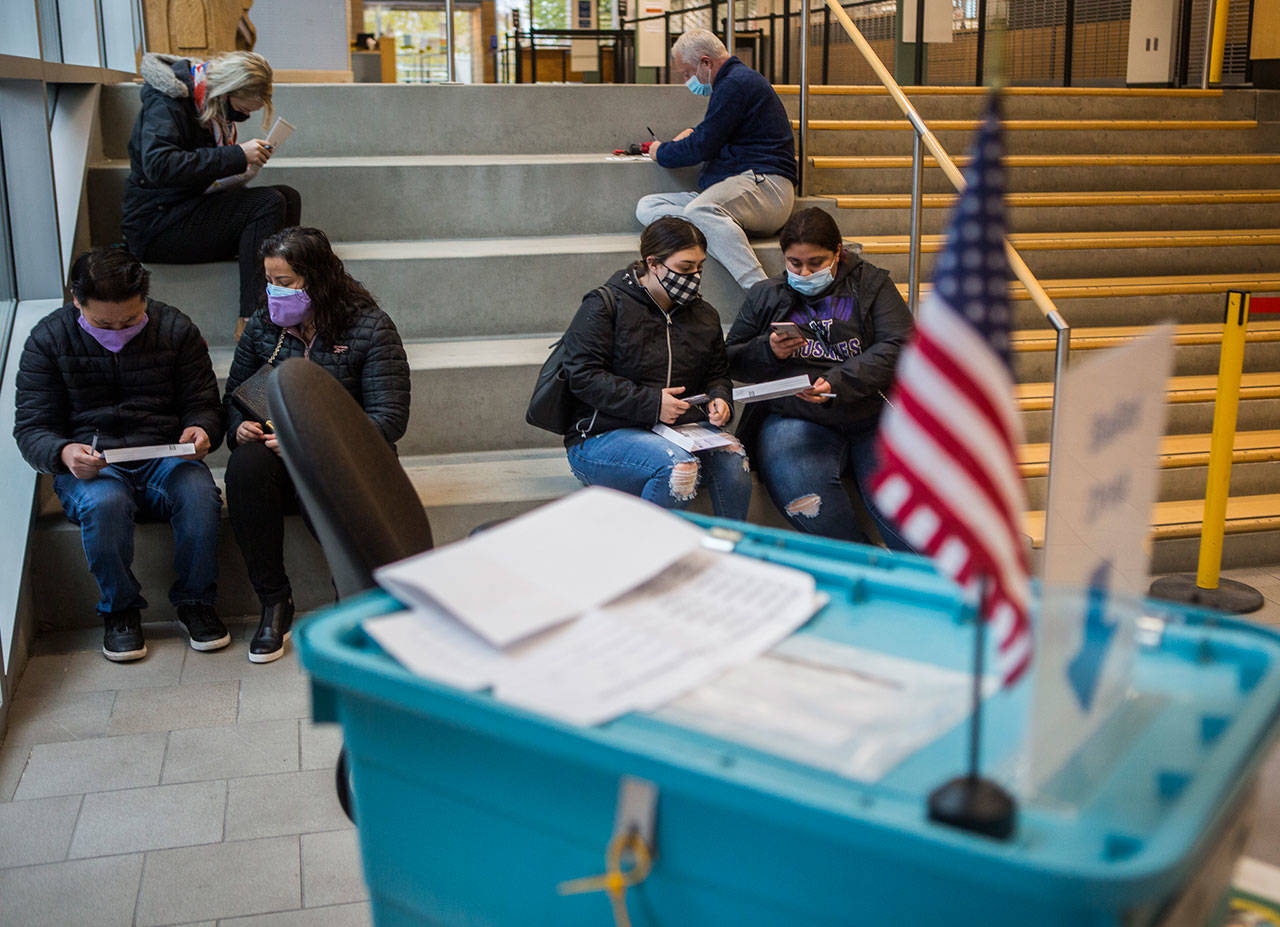By The Herald Editorial Board
“I could talk about the 2020 election for the rest of my life; and probably will,” Washington Secretary of State Kim Wyman said Friday in a telephone interview.
Even with the 2021 general election now just a couple of months away, Wyman and other election officials in the state are still having to defend the 2020 election and its legitimacy against baseless allegations of fraud and irregularities, mostly by supporters of former President Donald Trump who have never accepted the outcome of the presidential election.
Those claims were the basis for a so-called “public hearing” two weekends ago in Granite Falls, called by state Rep. Robert Sutherland, R-Granite Falls, to present evidence of ballot fraud and irregularities. Sutherland followed up this weekend on his Facebook page urging state residents to demand a “full, independent, forensic audit of our 2020 elections,” much the way Arizona Republicans in its state legislature authorized an audit of its November election.
Following the election, Sutherland and other Republican leaders in Snohomish County insisted there were problems with the vote and reason for Trump and others not to concede.
“I want to see every legal vote counted. I will accept either (candidate) if it is a fair election,” Sutherland said in November. “I am not at all convinced this is a fair election. I am not sure we can find out the true outcome.”
Those same challenges have continued, now under the banner of “election integrity.”
And who doesn’t want our elections to be fair, accurate and trustworthy? Elections are the foundation of our representative democracy, after all.
So, yes, bring on the evidence of election fraud, dead voters, fraudulent ballots and manipulated vote counts.
Any time, now.
From the start, we have heard plenty of claims of fraud and irregularities, and the public and election officials have invited that specific evidence to be brought forth, only to be presented with more general and unsupported claims of irregularities and fraud.
This, Sutherland and others in his “AUDIT WA caucus” claim, is reason for Washington state to undertake an audit of Washington state’s 2020 election.
Seemingly in preparation for such an audit, state Rep. Vicki Kraft, R-Vancouver, who attended the Granite Falls meeting, wrote Secretary of State Wyman and auditors in each county last week asking that county election offices preserve records in advance of any updates of election software or hardware.
“I am writing to request and demand that a forensic image of any and every election system in each county, especially any used in the November 2020 election, be properly captured,” she wrote. “Capturing a forensic image of these systems will work to help ensure the integrity of the system before and after the upgrade. It will also provide the proper information needed in the case of a forensic audit.”
Kraft also asked to be advised of the retention policy for digital and paper records and the process for “forensic imaging.”
Kraft, in her letter, did not define what a “forensic image” is.
And Wyman isn’t certain either.
“We are not familiar with the term,” Wyman said Friday in a phone interview.
And in a response to Kraft’s public records request, the Secretary of State’s public records office notified the lawmaker “the Legislature has not required — and the Office of the Secretary of State does not have — such a record.”
A request for records that don’t exist doesn’t instill much confidence in the AUDIT WA caucus’ call for a forensic review of the election. Not that Arizona’s forensic audit has instilled much confidence at its conclusion.
Conducted by the cyber-security firm, Cyber Ninjas, Arizona’s forensic audit was expected to be handed over to state lawmakers on Monday, although its findings would not be made public immediately, the Associated Press reported Monday.
Even before release, its findings are unlikely to be taken seriously, except by those already certain of fraud.
“There are too many flaws in the way this review was conducted to trust it,” said Trey Grayson, a former Republican secretary of state in Kentucky who was the coauthor of a paper outlining the extensive problems in the Arizona audit, the AP report continued. Grayson cited a series of red flags, including biased and inexperienced contractors, conspiracy-chasing funders and bizarre, unreliable methods, including attempts to determine the bamboo fiber content of Arizona ballots as proof the marked ballots had been flown in from China.
The call for a forensic audit by Sutherland, Kraft and the handful of other lawmakers who attended Sutherland’s recent summit, is certain to fall on deaf ears among the rest of the Legislature. And it should.
Nationally, the election was determined by government and election officials to be “the most secure in American history.” The same is no less true of Washington state’s election processes, independently operated by it 39 county auditors and the Secretary of State’s office.
Again, election integrity is important and must be protected from instances of fraud and irregularities. And it is. There are scores of procedures in the state for ensuring the integrity of ballots and elections, chief among them a paper record — the ballots and their signed envelopes — that are available for recounts after an election, providing a significant measure of integrity.
Wyman’s aside about having to discuss the 2020 election for the rest of her life is recognition of her concern that some 60 percent of Republican voters doubt the outcome of the November election. It reflects, she said, a dangerous erosion in public confidence in the state’s elections.
But, in the repeated absence of legitimate, verifiable evidence of fraud and irregularities, it is now these baseless claims that are responsible for a loss of confidence, not the election.
Talk to us
> Give us your news tips.
> Send us a letter to the editor.
> More Herald contact information.

























